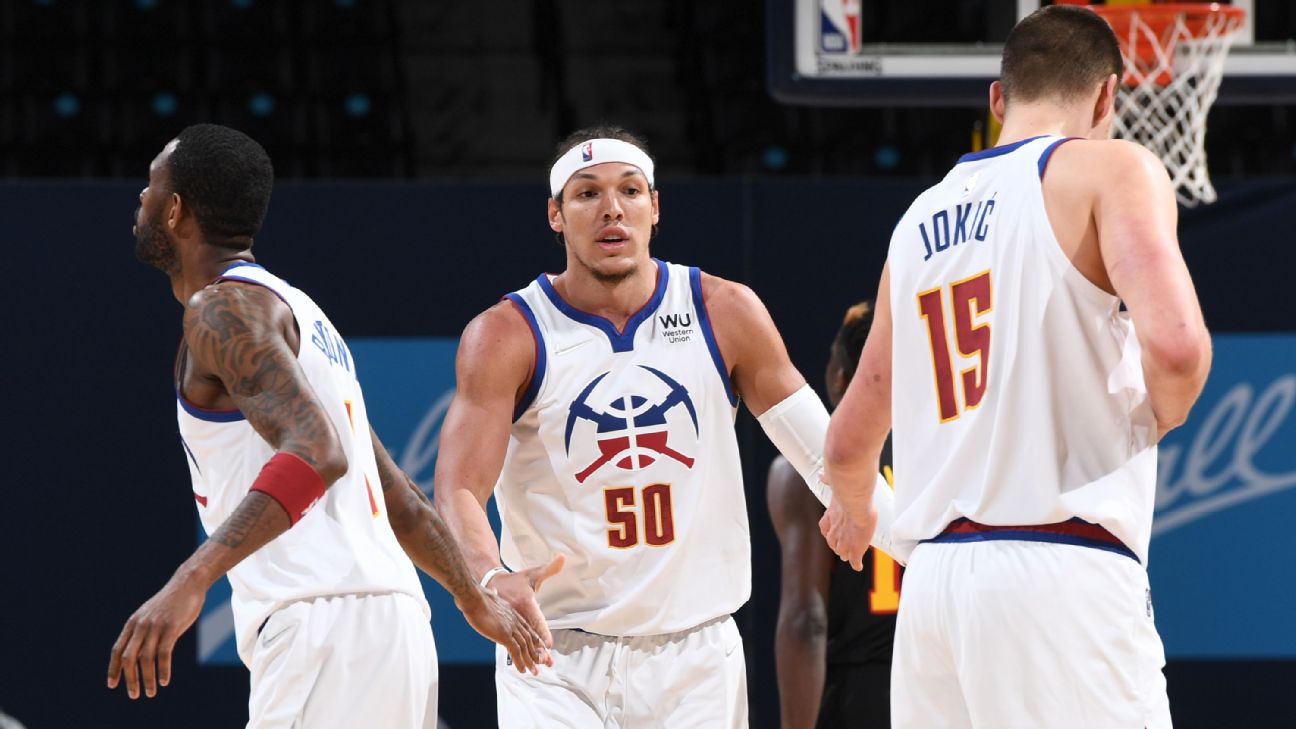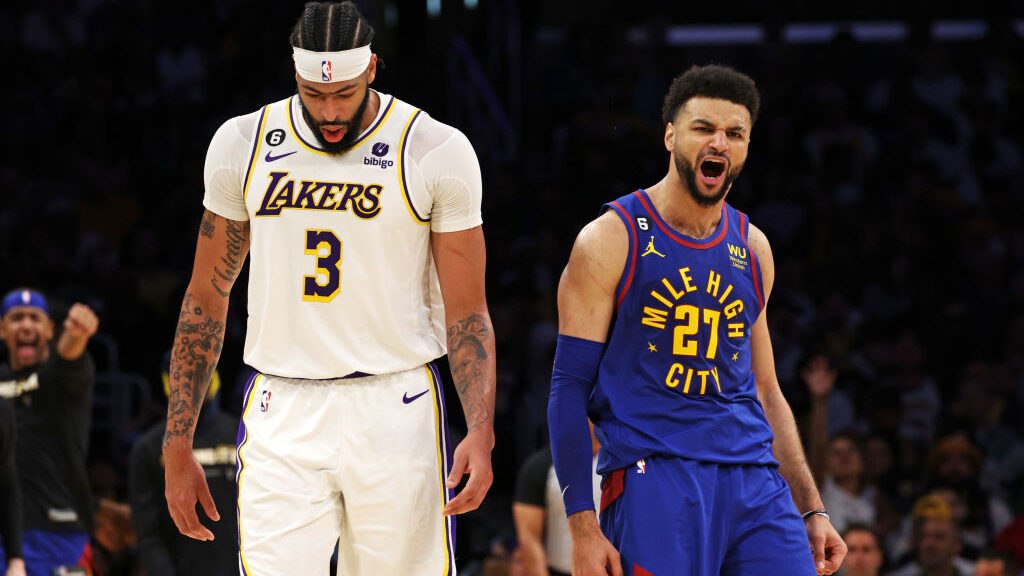One week ago after the Denver Nuggets secured a 108-103 victory in Game 2 of the Western Conference Finals, Head Coach Michael Malone dropped a gem in the postgame press conference: “In the playoffs you can’t be a specialist. Specialists don’t play in the playoffs.”
And his Denver Nuggets perfectly personify this; none of their core six is a one trick pony. Nikola Jokic’s scoring and playmaking makes him the league’s premier offensive talent, while Jamal Murray's combination of pull-up shooting and playmaking makes him a weapon offensively. Michael Porter Jr. is one of the league’s best deadeye shooters while making major strides defensively, while frontcourt mate Aaron Gordon is a great defender and has been weaponized as a cutter. Kentavious Caldwell-Pope epitomizes the modern NBA’s 3&D role, and Bruce Brown has added to his game every season, as he is a playmaker, slasher, defender, and shooter at this point in his career.

Their Conference Finals foe’s roster doesn’t quite exemplify this need for all-around ability of basketball, and perhaps nobody on the Lakers exemplified this better throughout the course of this recently completed series than D’Angelo Russell. In the opening two rounds of the playoffs, Russell averaged 15.7 points and 5.0 assists (1.9 turnovers) on 54.1 TS% (44.5/34.7/77.3 shooting splits) in 31.6 minutes. In the four Conference Finals games, Russell averaged 6.3 points and 3.5 assists (1.5 turnovers) on 38.2 TS% (32.3/13.3/75.0 splits) in 23.5 minutes.
His numbers from the first two series were a step down from his regular season form, too, where he averaged 17.8 points and 6.2 assists (2.6 turnovers) on 60.5 TS% (46.9/39.6/82.9 splits) in 32.5 minutes. While these box score statistics show a dip in Russell’s play, they don’t explain the full story and the why to the dip.
As a ball-handler, Russell failed to punish the Nuggets’ defense in drop, as he failed to efficiently drain pull-ups and dish the ball to teammates. Kentavious Caldwell-Pope needs credit for this, certainly, as his screen navigation assured that Russell (1) couldn’t get to his patent pull-up three out of the pick and roll and (2) couldn’t get good looks on the pull-up triples when he did get to them. All in all, Russell, who shot 22.6% of his shots as pull up threes during the regular season at a quality 38.3%, saw both of those respective numbers fall to 16.1% and 20%, respectively. Shots like the below should generally be falling at a higher clip than they did for Russell, especially since Caldwell-Pope gets caught up on the screen and is a tad alte to contest.
The Nuggets were effectively able to shrink the floor for Russell on the ball, forcing him to make decisions. At the same time, they walled him off from the rim, where he saw just one attempt in the entire series, while 25% of his shots as a Laker this year came at the rim. Additionally, he wasn’t able to create any super high quality looks for the Lakers since he didn’t command much nail help or weak side help; the Nuggets did a quality job on defense. Overall in the postseason, Russell scored 0.72 points per possession as the pick and roll ball-handler, a steep drop from the 0.90 of the regular season. Russell succeeded when he actually got to his mid range pull-ups, shooting 7/13 on pull-up 2s. With that said, those 7 makes cannot make up for his terrible catch & shoot performance, a clear-cut detriment to the offense.
During the regular season, Russell’s 40.8% on catch and shoot threes (3.8 attempts per game) was huge for the Lakers offense. It was a large part of why the Lakers had a 122.4 offensive rating when Russell was on the floor during the regular season, which would have ranked first in the league by about 3 points per 100 possessions. During this series, he shot 1/10, an egregious 10%, on catch & shoot triples. Throughout the entirety of the postseason, that number was a better, yet still poor, 33.3%.
Therefore, Russell didn’t punish the Nuggets for their help on LeBron James. Furthermore, he didn’t attack closeouts to create many additional advantages for the Lakers. Add all of this together, and he was a net negative for the Lakers offensively in the series. Bringing this back to Michael Malone’s comment about specialists, Russell may not be quite a specialist, but when you’re as poor of a defender as he is, he needs to bring it offensively. He’s got to knock down shots like the ones below, and that one is an especially ugly miss.
During the regular season, teams didn’t attack Russell defensively, so the Lakers were statistically better defensively with Russell on the floor (though this was truly because the Laker that Russell shared the floor with the most was Anthony Davis). In the postseason, it’s a different story; defenses schemed to get Russell in action, and particularly the Nuggets. The Lakers defensive rating with Russell on the floor in this postseason was 115.3, but when he was off the floor, it improved immensely to 105.6 (for reference, this would be the league’s best in the past three seasons).
Following the Nuggets’ Game 1 victory, Bruce Brown told the media that the Nuggets gameplan to attack Russell’s defense, saying “[Russell’s] not the best defender, so we wanted to make it tough on him.” During Game 1, the Nuggets took 13 shots with Russell as the defender, per nba.com (the highest mark of the series), and made 7. Overall on the series, the Nuggets shot 17-33 with Russell as the closest defender.
**The Lakers always looked to put Russell on the worst offensive guard (or sometimes wing) on an opposing team, aiming to hide him. Russell isn’t too quick on his feet and is prone to being blown by, and he is quietly only 193 pounds, so some bigger and stronger guards can take advantage of him. Additionally, he isn’t a great screen navigator and is prone to sometimes falling asleep defensively. All in all, he’s bad defensively and does not provide positive value in the slightest. **
In this Nuggets series, his assignment was Kentavious Caldwell-Pope, who certainly can still provide offensive value with his shooting prowess and ability to come off of handoffs. Whenever Bruce Brown saw Russell in transition, he was sure to attack him to get to the rim. Whenever Jamal Murray saw Russell matched up with him, he immediately went to an isolation or pick and roll. He is that exploitable on that end of the floor; just look below to see (1) Russell’s poor defense and (2) the Nuggets’ desire to attack him.
Here’s a quick breakdown of the above:
-
Clips 1 & 2: Bruce Brown sees the weaker, poor defender of Russell in his path in transition and immediately attacks.
-
Clips 3 & 4: Russell falls asleep off ball for just a short period of time, but the Nuggets (Caldwell-Pope) take advantage.
-
Clip 5: Russell’s screen navigation is poor and leads to an uncontested mid-range pull-up for Caldwell-Pope.
-
Clip 6: The Nuggets see Russell on Jamal Murray and immediately go to a pick & roll and give Murray the whole side of the floor to cook.
Unfortunately, this year’s Russell playoff disappearance is not a new occurrence; the same happened last season with Minnesota. During the 2021-22 regular season, he averaged 18.1 points and 7.1 assists (2.5 turnovers) on 54.4 TS% (41.4/34.0/82.5 splits). In the playoffs, all of these numbers dipped to 12.0 points and 6.7 assists (2.8 turnovers) on 45.5 TS% (33.3/38.7/75.0). This trend with Russell isn’t a promising one, especially for a player who reportedly had hopes of signing a contract over $100M at one point this season. It’s likely safe to say that will not be the case, and it’s likely that he will not even be in a Los Angeles Lakers uniform next season.
Here’s the difference between Jamal Murray and D’Angelo Russell, going back to Michael Malone’s take on specialists: although both are poor defenders, Murray exceeds beyond an offensive specialist because of not only his clear-cut superior tough shot making but also with his ability to playmake and play off of the ball in a superior manner, demanding more defensive attention. Defenses fear Murray, so his lack of defense is made up for in a much, much more impactful way (as is the case with some of the league’s most elite guards). Murray doesn’t shrink when the playoffs approach, while Russell does. There’s miles of difference here.

Russell isn’t quite the same type of specialist as his teammates Jarred Vanderbilt or Malik Beasley, for example, both of whom were acquired with Russell from the Minnesota Timberwolves mid-season. Russell is an offensive specialist to an extent in that his lack of defense gets clearly exposed in the postseason amidst his offense shriveling up. He is not quite strong enough as an offensive player in his shooting, pull-up threat, or playmaking to make defenses adjust their schemes and truly fear Russell, making him truly a postseason liability when shots aren’t falling. However, it’s hard to label Russell as purely a specialist.
The Guangdong Tigers or Shanghai Sharks jokes on Twitter may be funny, but there will certainly be a team willing to take Russell on next season. He’s certainly a positive regular season player with his offensive talent between his shooting and playmaking, and if he can figure it out in the playoffs to command respect, he will be an impactful postseason player as well. Teams in need of a point guard should be reaching out to Russell if he doesn’t demand too much money. He needs to get off of the edge of the offensive specialist term for the postseason and step up his game for the season’s second season to be legitimately impactful.
Charlie Spungin , NBA Analyst